- Home
- slideshows
- miscellaneous
- A flight attendant's primary job is to keep you safe - and they're trained extensively for any kind of emergency
A flight attendant's primary job is to keep you safe - and they're trained extensively for any kind of emergency
Getting through flight attendant training is no walk in the park

Flight attendants have six to eight weeks to learn everything there is to know about the plane, FAA and other safety regulations, and how to handle emergencies
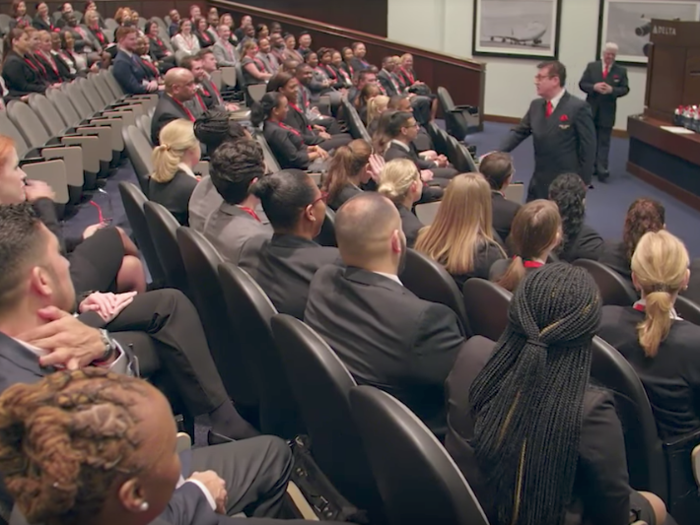
For many airlines, training lasts around six weeks. Other airlines' trainings last eight weeks.
During flight attendant training, students have a huge amount of information to learn, which Long considers a challenge given the time.
"It's really stressful. And you can't study ahead — you have to stay right where you are at all times, so you can't even try to get ahead," she said.
Among other things, students learn federal aviation regulations, how to defend themselves and passengers, how to evacuate on water and land, how to handle medical emergencies, and how to use all the equipment.
"The whole training is devoted to — with very few exceptions — learning the aircraft and the safety aspects of it," she said.
Long recalls a time when her training was put to the test during a 747 flight to Frankfurt. "I was brand spanking new on this plane — and the cockpit had an alarm that told them there was smoke up in the crew rest," she said.
"So here I go running through the airplane with my fire extinguisher and another flight attendant and pulling out panels to where the pilot told us to go," Long said.
"Fortunately it was just a faulty alarm. But when you're thinking about fire over the Atlantic in a 747, it'll get that training out," she said. "It's down to you. It's not like they can land in the nearest airport."
Medical training covers all the bases
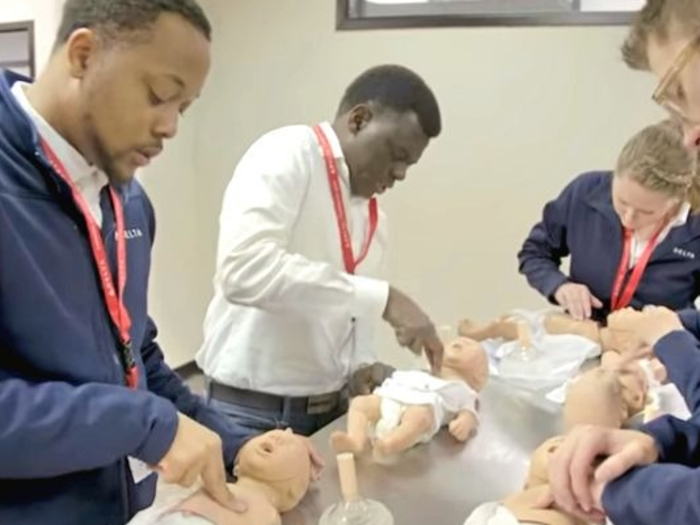
As part of Delta Air Lines' "Earning Our Wings" YouTube series, an instructor named Mallory said that on her very first flight as a flight attendant, she had a medical emergency on board. Luckily, thanks to her medical training, she knew exactly what to do.
"It's multiple hats wrapped into one," a flight attendant trainee named Cesar said in the video. "If something were to happen on board an aircraft, you are the doctor, you are the police officer ... you are the firefighter if need be. We have to be prepared for anything."
During medical and first-aid training, flight attendants learn all manner of skills, from using an AED to performing CPR on adults, children, and infants.
"I could deliver a baby if I have to," Long told Business Insider.
"These skills are just great life skills," a flight attendant trainee named Sharyl said in the Delta video.
During training, flight attendants learn how to evacuate a plane with half of the exits blocked within 90 seconds
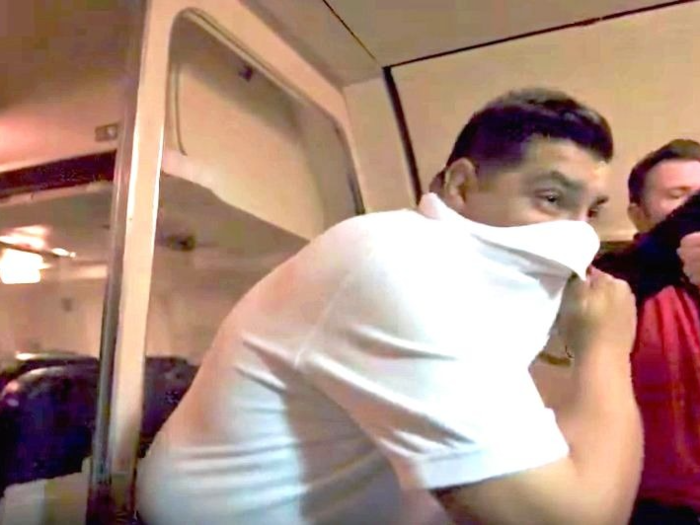
Flight attendants learn emergency management in a flight simulator, where trainees begin by playing the part of the passenger, occupying the seats of the mock airplane.
When the simulation begins, "all of a sudden, the lights go out, and we're being told to put our head down and stay down and prepare for impact," a flight attendant trainee named Daniel said in the Delta video. "It was shocking."
As a voice telling passengers to "brace for landing" comes over the intercom, instructors bellow "Bend over," "Stay down," and "Stay seated" in unison, as flight attendants might during an emergency situation.
"We smoked out the cabin and started yelling our commands," an instructor named Mallory said. "They really get to see what as a flight attendant you do in an emergency."
Finally, they evacuate the plane using the emergency slide.
"It definitely makes your blood pressure escalate," a flight attendant trainee named Cesar said.
The Federal Aviation Administration requires Delta flight attendants to be able to evacuate an aircraft with 50% of the exits blocked within 90 seconds.
Flight attendants have to do water evacuation drills as well — even if they don't know how to swim
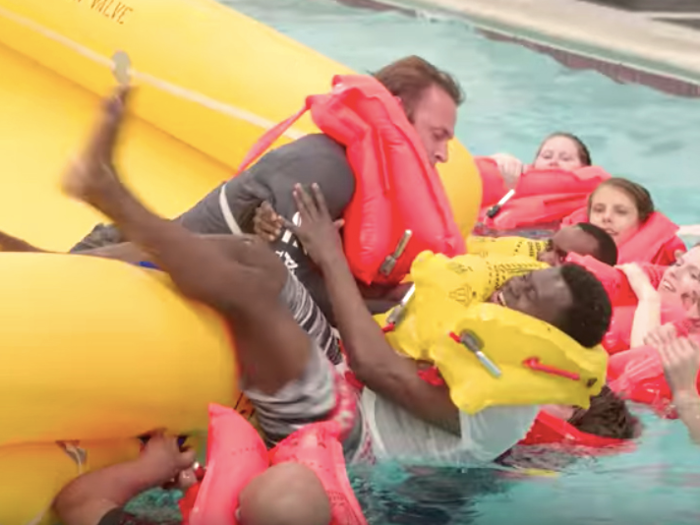
Flight attendants must get in the water to be able to pass the pool drill during training.
Luckily trainees have flotation devices, and the three trainees in Delta's video who didn't know how to swim were able to complete the drill .
"On pool day, I thought it would be pretty simple — I mean you float and you have to have a flotation device," a flight attendant trainee named Kacey said in the video. "I had no idea how many different things went into something that sounded so simple."
During the pool drill, trainees practiced pulling each other around the pool and into the emergency raft. "I was beat tired by the time that hit," Cesar said.
"I had no idea it would be that hard to climb into a raft," Kasey said.
The training never leaves flight attendants
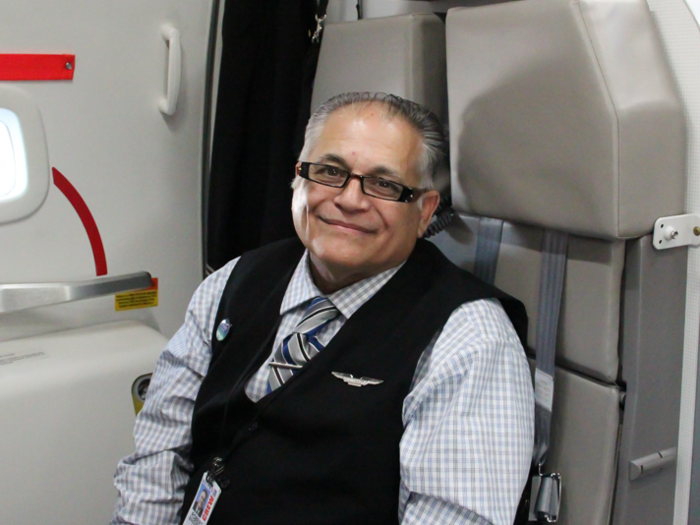
During takeoff, United flight attendant Robert "Bingo" Bingochea told Business Insider his mind goes to a different place.
"You go through the different situations that can happen in your head," he said.
According to Bingochea, protocol for different emergency situations are embedded in flight attendants from day one of training so that, in an emergency, they don't have to think about it. "It's just there," he says.
"We always go through these silent drills in our mind so, should something happen, we're ready to take on this challenge," he said.
And to supplement their training, flight attendants must refresh their skills every year
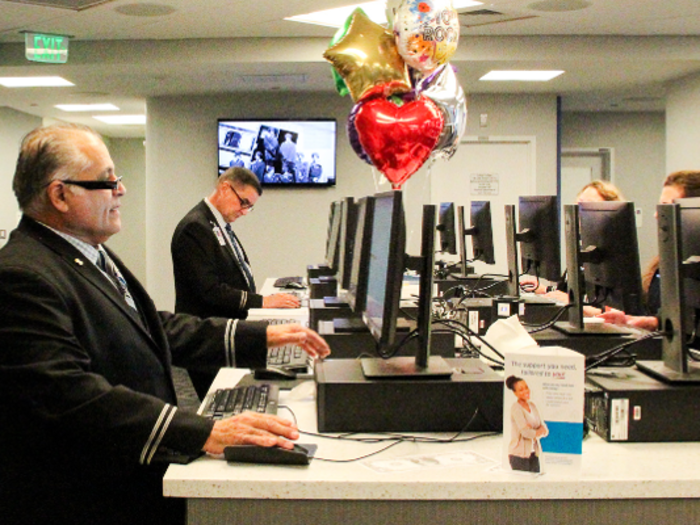
The crew-only areas inside airports often house computer stations and training areas so flight attendants can stay up to date and complete training modules, which they must do every year.
Popular Right Now
Popular Keywords
Advertisement